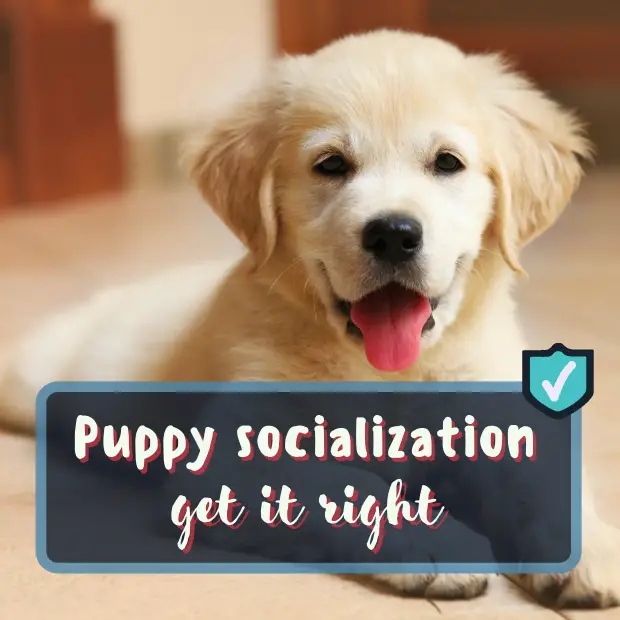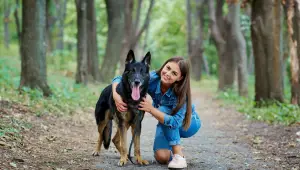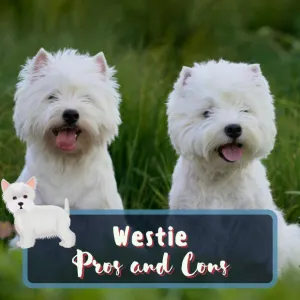Table of Contents
ToggleWhat is puppy socialization?
What if I told you proper socialization is about teaching your dog to ignore stuff instead of play with it?
As soon as pup’s vaccination series is complete and they are able to go out without the risk of infectious disease transmission, many pet parents are keen to get their new addition signed up for a myriad of classes. They plan a busy social schedule that would make most A-list celebrities look like absolute hermits by comparison… but…, not so fast….
What’s the deal with puppy socialization?
The term can, and has, been defined in many ways. I like to think of it as teaching your dog to accept that everyday situations, surfaces, smells, sights and sounds are normal – and nothing to get excited or worried about.
In other words, to ignore stuff instead of being scared of it or playing with it. For example: when we go out for a walk and we meet another person or dog; we train them to react calmly by ignoring humans and pooches that pass us. Teach Fido that other dogs and people are none of their business and you’ll have a much easier life.
In this article, I will explain why this sensitive period in your puppy’s development should be approached with caution. Overdoing it can cause a behavioral issue and be just as bad as under-socialization.
Why is puppy socialization important?
Think about how you want your puppy to behave as an adult dog. The goal of puppy socialization is to teach them that everyday situations are nothing to be worried about or to get excited about. We want our furry friends to behave calmly and confidently in public, without getting overemotional in any way.
The consequences of getting it wrong can be dangerous and even life-threatening to a dog. Relinquishment of dogs to animal shelter organisations is often due to behavioral issues – many of which could have been prevented with a different approach to socialization.
This is an important part of their education, to help them become a confident member of your family and community.
What age should you start puppy socialization?
The first critical socialization window begins to close at around 17 weeks of age, so time is of the essence and you should get going right from when you bring your little one home. If possible, regular outings most days will be beneficial to both you and your new canine family member.
Can you socialize a puppy before vaccinations?
You can take them out before they’re vaccinated, but it’s important to be safe and sensible about it. If you adopt a puppy at two months of age, they aren’t fully vaccinated. They cannot go on the ground out in public just yet, due to the risks of infectious diseases such as parvo and distemper.
By holding puppies and carrying them there is still a ton of value to be gained from this type of outing, so make sure that you carry them around in a sling or use a doggy stroller!
Are puppy socialization classes necessary?
This seems to have become a buzz word over the past couple of years. Everyone has an opinion on what class you should attend so your puppy will be “socialized” enough. Many have popped up since this has become popular but unless a qualified behaviorist is in charge, I’d advise owners to run a mile – and here’s why…
Are puppy socialization classes safe?
Puppy kindergarten may seem like the perfect place for your new addition to meet new people and canines, but can cause your furry friend to become mouthy and/or reactive if they are overwhelmed in these situations, and a lot of owners do not recognize when their puppy is feeling uncomfortable, anxious or scared in a situation.
The problem is the focus on introducing our puppies to as many dogs as possible, as well as taking them to all kinds of different events such as baby groups, the mall, farmers markets etc. without actually understanding how Fido is feeling about being in that situation.
Over-socializing your pooch can cause reactivity and aggression, which is why I don’t recommend taking your puppy out to every party, coffee shop or event. In my opinion as a dog trainer, I advise avoiding dog parks too!
How much socialization does my puppy need?
It is important to note that just because you take your puppy out does not mean he or she will be ‘socialized’.
Over-socialized dogs are often the ones that have had too many overwhelming interactions with other canines and new people, to the point where their stress levels are very high around them. As a result, they may show behaviors such as barking, lunging, mouthiness and so on.
Under-socialized dogs are the ones who have had very few experiences outside of home or other secure environments such as backyards or gardens. If your dog is not used to contact with people or pooches, then it will be difficult for them to cope. They may show fear signals, such as cowering or hiding, and they may be afraid of walking anywhere.
Honestly, if I had a puppy now, I would not be letting them run around with other dogs outside of my own friends and family and here’s why. Many caregivers contact me for help when their adolescent pooch can’t walk past another dog on the street without losing their mind because they want to “say hello” to every canine they see.
If Fido’s expectation is to play with every dog they clap eyes on, this can lead to something called “frustrated greeting”. This is the term used when a dog is so desperate to get to see another dog that they bark and lunge towards them. If this results in an overload of frustration, some poor pooches can become so overstimulated that they “redirect” and bite their owner.
At the opposite end of the spectrum, there are pups who have been “told off” too harshly by other dogs and are now fearful of their own kind. Most pups are fairly resilient, but sometimes, it only takes one unpleasant interaction, one harsh telling off, one aggressive encounter, for a pup to become reactive to other dogs. In many cases, it doesn’t even have to involve any physical injury.
It is important to recognize that most dogs need small doses of exposure so they can cope in different situations and come back for more. It is not beneficial to expose your puppy to the point where they become overwhelmed as this can result in the development of fear-related behaviors.
As trainers, our job is not only to improve our clients’ dogs’ behavior, but also to educate them on how their dog learns. One important aspect is recognizing how much your puppy can handle. If they aren’t having a positive experience, it’s not good socialization. It’s important they stay comfortable in order they learn what you want them to from those situations.
If you find your puppy is showing subtle indicators of stress such as cowering, lip licking, turning away or yawning, it may be time to take a step back and reduce their outings for a while so they can relax and come back for more another day. If your pup shows signs of stress or takes a while to come out of that stressed state, then avoid taking them to similar situations for at least a few days and focus on building up their confidence and coping skills.
Few pooches will relish every socialization opportunity out there, so it is important to assess what your pup enjoys and at which point they show stress. If their body language changes after a certain duration in a situation, then that is the best indicator for you, whether it is too much for them or just right.
Eating is another great clue whether your furry friend is happy in a situation. When dogs are stressed, the digestive system shuts down and they will refuse food.
For outings, choose a time when it is not too hectic and there will be less chance of your pup becoming overwhelmed. Try to go out when they will be peckish so they are more likely to focus on you. A good way to get them used to these stimulating environments is by ALWAYS bringing some yummy treats along.
When you arrive, have your pup on a leash and let them have a sniff around to check out the new surroundings. Then, give them some treats or play with them, so they understand that great things happen WITH YOU in these environments!
It is important to take your furry friend out regularly, so they recognize that these are good places for them to be. If the first few outings do not go as planned and they become over-stimulated quickly, it is best to take them home and try again on another occasion.
Where can I socialize my puppy?
Puppy Socialization should include:
- Attending puppy class where your pup is there to focus on YOU, such as recall class or puppy obedience class – NOT a puppy free-for-all play session.
- Small, controlled groups of dogs such as your training class or puppy group, where your pup does not necessarily get to interact with the other participants.
- Small social gatherings where the surroundings are relaxed and not overwhelming for your pup.
- Quiet outings to a coffee shop where pup will not be approached by people or other dogs.
- Taking them to the veterinary clinic to sit in the waiting area.
- Taking them out on short car rides.
- Running the vacuum cleaner at home whilst they enjoy a chewie in their pen.
- Watching the world go by at a distance from a park bench.
Avoid the following:
- Large, rowdy groups of random dogs engaging in unstructured play, such as public dog parks, the beach and off-leash areas.
- Large social gatherings where the environment is overwhelming for your pup, such as baby groups, where you will often find toddlers or small children running towards your pup, or malls that are crowded with too many people.
- Long outings to loud and bustling places where you don’t have an easy exit plan if your pup is uncomfortable.
- Unstructured daycare – very few young dogs are suited to being in a large group and many exhibit lots of stress signals in this type of situation.
Keep it low key and calm.
The ‘Settle on a Mat’ Game.
Another great way to introduce your pup to new surroundings without them getting overwhelmed is by playing the ‘settle on a mat’ game.
This game teaches pups that they get to make choices and it can help calm them down, even in very stimulating environments.
The game is simple. You place a mat or towel on the ground and encourage your pup to lie down on it. When they do, give them a treat so they know being on the mat means good things happen!
You can start off by playing this in your home and in other less distracting environments such as your backyard. With time, you can visit busier and more distracting areas with the mat, such as coffee shops or shopping malls.
Playing the settle on a mat game during outings is a great way to build up your pup’s confidence and teach them they get to make choices. This will go a long way to helping prevent future emotional issues with anything new or scary! Your furry friend will associate the mat with good things, so it will help them relax in the new location.
Teach your puppy that all the good stuff comes from YOU. Aim to ensure they do not receive rewards or reinforcement from sources you cannot control. This includes other pooches and people.
Whilst it’s important that they meet a variety of people, if they learn that other people have yummy treats, they may want to mug strangers whenever they see them. If they learn other friendly dogs are amazing fun to play with, your recall and handler engagement will suffer.
Teach your puppy that everything they want is within your control. This helps them focus on you and will make your life a lot easier.
I hope that’s given you some useful info. Remember to introduce your pup to new experiences at their pace. Aim to create a positive association with new situations, with any rewards coming from you.
If you are looking for more info on basic training, have a look at this article on how to make your training more efficient using marker words.







